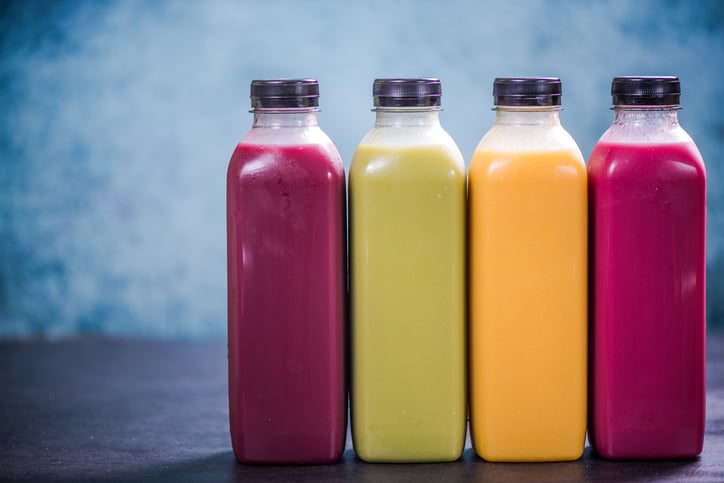Why Detox Diets & Methods Don’t Work (do this instead)

If you’re looking for a quick-fix detox diet, you’re in the wrong place. Like we’ve talked about before, despite their enticing promises, popular detox diets and radical juice cleanses don’t work.
Well, I suppose that depends on how you define “work.” But that in and of itself is one of the biggest problems with detox diets. They’re typically short-term (3 days to 2 weeks) and promise to eliminate toxins from the body, promote health, and assist with weight loss. This brings up one of the biggest problems with popular detoxes. There’s no “short-term” solution to long-term health and weight management.
Detoxes range from total starvation to juice fasts. They often involve the use of laxatives, diuretics, and unproven “cleansing foods.” Yet, despite the popularity of detox diets, the term “toxin” is poorly defined, especially among commercial detoxes, which encompass a broad range of things like pollutants, synthetic chemicals, heavy metals, processed foods, and other potentially harmful products of modern life. This brings up another problem: Popular detoxes rarely identify the specific toxins they supposedly remove or the mechanisms by which they eliminate them.
As far as weight loss goes, there’s no question that these (often extremely) low-calorie diets can “work.” Remember, weight loss hinges on a negative energy balance. And if you dramatically restrict calories, the number on the scale will go down. However, this is rarely quality weight loss, considering much of it is water weight and lean body mass.
And it is unlikely these radical short-term approaches are useful for maintaining a healthy weight (as they do little to encourage behavior change and lifestyle modification). Even worse, rebound weight gain is virtually inevitable in the face of metabolic adaptation, elevated stress hormones, and increased appetite.
But don’t just take my word for it. Take it from two recent review studies published in peer-reviewed journals:
- “No rigorous clinical investigations of detox diets have been conducted… Consumers should be made aware that the weight-loss claims of these detox products are not underpinned by any clinical evidence… At present, there is no compelling evidence to support the use of detox diets for weight management or toxin elimination.”1
- “Juicing or detoxification diets lead to weight loss because they require extreme caloric restriction but are not sustainable for prolonged periods of time. Although individuals may lose weight while on the diet, there tends to be weight gain once the diet has ceased.”2
Take-home: You can’t “wipe the slate clean” with crash detox diets or cleanses. Sure, you may feel better about yourself, you might lose a few pounds (which is likely to be mostly water and lean body mass), and you might even get a little healthier, which is likely the result of addition by subtraction (e.g., not eating junk food).
What Detox Diets Do Right
While gimmicky detox diets and quick-fix cleanses may not be the long-term answer, that’s not to say they don’t shed some light on methods that do work. For example, most of these approaches get a few things right:
- They usually eliminate processed foods, pre-packaged meals, fast food, added sugars, trans fats, refined vegetable oils, and pretty much all the garbage that defines the typical Western-style diet.
- They often encourage eating more minimally processed, whole foods, especially colorful fruits and vegetables.
- They frequently recommend eating fewer potential “trigger” foods.
- They almost always promote drinking more clean water.
- Not always, but often, they advocate regular physical activity and planned exercise.
- They almost always ban the use of drugs and alcohol. The latter is certainly associated with numerous health benefits when consumed in moderation. However, it’s an example of the phrase “the poison is in the dose.” And it doesn’t hurt to take a break from potentially addictive substances.
- Those that do “allow” you to eat typically suggest sourcing the “cleanest” versions of all categories of foods. For example, eat organic fruits and vegetables when possible. Choose meat, dairy, and eggs from organic, pasture-raised animals. Opt for sustainably sourced fish and shellfish that are low in heavy metals.
- They emphasize caloric restriction. While we’ve already covered the downside of severe restriction, most of us could use a lesson in portion control. Beyond that, there may be benefit to periodic dietary restriction (such as intermittent fasting and the fast- mimicking diet, which has been deemed “the longevity diet”), which plays a role in detoxification.3
14 Ways to Detox Your Body NATURALLY
Having said that, while the human body is a fully-equipped detoxing machine (via the liver, kidneys, GI system, skin, and lungs), the great news is there are several things you eat daily to support your body’s detoxification pathways, and the better news is that emphasizing these food choices can also promote optimal health and help maintain a healthy body weight.3,4
- Make sure you’re properly hydrated by drinking plenty of clean water daily.
- Eat plenty of colorful fruits and vegetables, which contain phytochemicals and fiber. In addition, certain fruits and vegetables contain D-glucaric acid, which can enhance the body’s detoxification pathways. Examples include oranges, spinach, apples, carrots, cabbage, Brussels sprouts, cauliflower, broccoli, grapefruit, grapes, peaches, plums, lemons, apricots, sweet cherries, cucumber, lettuce, celery, green pepper, and tomatoes.
- Eat cruciferous vegetables (e.g., broccoli, watercress), onions, and garlic, which contain phytochemicals that support detoxification.
- Make sure you’re consuming enough fiber by eating plenty of fruits, vegetables, legumes, nuts, seeds, and whole grains. Fiber supports a healthy digestive tract, one of the body’s detox organs, and may even help eliminate certain fat-soluble toxins.
- Consume fermented foods (such as yogurt, kefir, and sauerkraut), and supplement with a high-quality probiotic like Pro-X10 to support a healthy balance of gut bacteria and help fend off “bad” bacteria, which secrete endotoxins (e.g., lipopolysaccharide).
- Make sure you’re getting enough B vitamins and other nutrients that support methylation, which represents a critical phase of detoxification:
- Methionine, found in meat, poultry, fish, shellfish, nuts (e.g., Brazil nuts), seeds (e.g., pumpkin and sesame seeds), spirulina, whole grains, and legumes
- Vitamin B12, which is found predominantly in animal-based foods, like meat (especially organ meats), poultry, fish, shellfish, and eggs
- Vitamin B6, which is found in meat, nuts (e.g., pistachios), garlic, whole grains, seeds (e.g., sesame and sunflower seeds), legumes (e.g., chickpeas, lentils), and prunes
- Betaine, which is found in quinoa, beets, spinach, whole grains, sweet potatoes, meat, and poultry
- Folate, which is found in beans, lentils, nuts and legumes (e.g., peanuts), seeds (e.g., sunflower seeds), spinach, asparagus, mustard greens, and avocado
- Magnesium, which is found in seeds (e.g., pumpkin and sesame seeds), beans, nuts (e.g., Brazil nuts, almonds), and whole grains
- Eat plenty of high-quality protein, which provides amino acids (e.g., glycine, taurine, glutamine, ornithine, and arginine) that are required for detoxification.
- Consume foods (such as apples, apricots, blueberries, kale, alfalfa sprouts, green beans, black tea, and chili powder) containing the polyphenol quercetin, which may support detoxification.
- Consume foods containing ellagic acid (e.g., berries, pomegranate, grapes, and walnuts), which may promote detoxification.
- Consume grapes, red wine, and peanuts, which contain resveratrol, another phytonutrient that supports detoxification.
- Consume green tea and coffee, which contain compounds (EGCG and caffeic acid, respectively) that support the body’s detoxification pathways.
- Consume coriander/cilantro, malic acid (found in grapes, wine), citric acid (found in citrus fruits), succinic acid (found in apples, blueberries), citrus pectin (found in the peel and pulp of citrus fruits), and Chlorella, which all exhibit “chelating” properties. In other words, they can bind to and help eliminate potentially toxic heavy metals.
- Consider supplementing with turmeric/curcumin, which may support detoxification a number of ways. For example, curcumin has been shown to promote the release of nuclear erythroid-derived 2 (Nrf2), which is considered the “master regulator of antioxidant response” and is also key to regulating detoxification. Catechins (e.g., green tea, cocoa, legumes), resveratrol, ginger, coffee, rosemary, blueberries, pomegranate, naringenin (e.g., grapefruit), ellagic acid, and astaxanthin (e.g., krill) may also increase Nrf2.
- Consider supplementing with whey protein, which effectively boosts levels of glutathione, the body’s “master antioxidant.” Glutathione is most heavily concentrated in the liver, the major organ involved in detoxification, highlighting its role in detox processes.
The New Optimized YOU
Whew! There’s obviously no shortage of foods you can eat to support detoxification… So, why starve yourself and suffer through an unnecessarily restrictive detox diet or juice cleanse? Maybe it’s the notion that extreme results require extreme measures. Or as a group of researchers from Australia so perfectly speculated, “The seductive power of detox diets presumably lies in their promise of purification and redemption, which are ideals that are deep-rooted in human psychology.”1
Be that as it may, the point is this: Emphasize a diet rich in whole, minimally processed, colorful foods.







